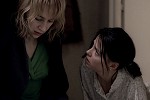 Shadows off the beaten path
Shadows off the beaten pathTHE LAST MISTRESS | SILENT LIGHT
< < F O R E I G N > >
last update 18.Oct.07
See also: SHADOWS FILM FESTIVAL
 R E V I E W B Y R I C H C L I N E
R E V I E W B Y R I C H C L I N E Le Scaphandre et le Papillon
Le Scaphandre et le Papillon
 MUST-SEE
MUST-SEE
 In his third film, Schnabel continues to examine the inner lives of real artists, this time French writer Jean-Dominique Bauby, whose extraordinary story is told with creativity, insight and genuine emotion.
In his third film, Schnabel continues to examine the inner lives of real artists, this time French writer Jean-Dominique Bauby, whose extraordinary story is told with creativity, insight and genuine emotion.
In 1995, 42-year-old Elle editor Bauby (Amalric) suffered a debilitating stroke, leaving him with "locked-in syndrome", in which the whole body is paralysed but the mind is completely intact. Bauby's only method of expression is blinking his left eyelid. Helped by two therapists--working on speech (Croze) and physio (Garmendia)--he develops a time-consuming system to communicate. And after overcoming his initial self-pity, he reconnects with his ex (Seigner), mother to their three children, and works with a patient transcriber (Consigny) to write his memoir.
Schnabel tells this story from Bauby's perspective; indeed, the film's first section is completely from his limited point of view. We live this story inside his head, hearing his thoughts and feelings as he's trapped inside his own body, like a diving bell under the sea. And we also visit his imagination and memories, which make him feel like a butterfly, able to travel and experience anything his mind can conceive of. Schnabel captures this delicate balance with grace, wit and a sharp sense of raw humanity.
And the cast is simply wonderful, never over-performing their roles or stretching out for manipulative high (or low) points. Amalric has the double challenge of playing Bauby's active rock-n-roll life in flashback, then the immobile present, all while maintaining both jagged humour and haunting guilt for relationships left unresolved. Von Sydow has a lovely supporting role as his testy father, while Seigner, Consigny and Croze all create vivid characters in very different orbits around Bauby.
All of this comes together with breathtaking sensitivity through Schnabel's visceral direction, Harwood's delicate script and Janusz Kaminski's swirling cinematography. And while the story is extremely downbeat, it's told with earthy energy and lyrical passion. It's Bauby's spiky cynicism that keeps the movie from ever being maudlin or sentimental. It also makes this a truly important film about what's really important in life.
scr Ronald Harwood
with Mathieu Amalric, Emmanuelle Seigner, Marie-Josée Croze, Anne Consigny, Max von Sydow, Patrick Chesnais, Olatz Lopez Garmendia, Niels Arestrup, Jean-Pierre Cassel, Marina Hands, Isaach De Bankolé, Emma de Caunes
 release Fr 23.May.07,
release Fr 23.May.07, US 30.Nov.07,
UK 8.Feb.08
07/France Pathe 1h52
TORONTO FILM FEST

17.Oct.07
 R E V I E W B Y R I C H C L I N E
R E V I E W B Y R I C H C L I N E 4 Luni, 3 Saptamani si 2 Zile
4 Luni, 3 Saptamani si 2 Zile
 MUST-SEE
MUST-SEE
 This is the first film in the series Tales from the Golden Age, recounting personal stories from Romania's communist period. And it's a cinematic masterpiece, following two young women on a harrowing odyssey.
This is the first film in the series Tales from the Golden Age, recounting personal stories from Romania's communist period. And it's a cinematic masterpiece, following two young women on a harrowing odyssey.
In 1987 Romania, two young women in a university dorm are preparing for a trip. Otilia (Marinca) is clearly in charge, but the nervous Gabita (Vasiliu) is the centre of attention. Otilia has told her boyfriend Adi (Potocean) that she might miss his mother's birthday party that night. And here's the truth: Gabita needs an abortion, and the naive girls are checking into a local hotel, where the illegal abortionist Bebe (Ivanov) patiently explains that they have badly underestimated the cost.
Told almost in real time, writer-director Mungiu uses extended long takes and tracking shots to establish a bracingly realistic tone, gripping us with authentic characters and situations. The film is packed with tiny details that both establish the setting and position the characters in a place and time that affect their lives in a profound way. Not only is this a vivid depiction of Soviet-era bureaucracy and black-market culture, it's also a deeply human story that's intensely moving.
The cast members deliver off-handed, natural performances. Marinca carries the film without flinching, even as the level-headed Otilia is forced into increasingly frightening situations. Vasiliu counters with Gabita's fragile insecurities, which include lying to herself and everyone around her. And Ivanov is impeccable as the opportunist who knows he offers an invaluable service; his balance of villainy and patient care is complex and riveting.
Along the way, Mungiu casually throws in shocking moments that leave us as stunned as Otilia and Gabita. He knows exactly when to cut away and when to indulge in graphic honesty, as well as when to linger for what seems like forever on a scene that's packed with meaning without ever being preachy. an extended dinner party scene is simply astounding on several levels, followed by a startlingly potent conversation between Otilia and Adi. This is expert filmmaking that takes us on a journey and leaves us utterly shattered, just as we should be.
See also: TALES FROM THE GOLDEN AGE (2009)
with Anamaria Marinca, Laura Vasiliu, Vlad Ivanov, Alex Potocean, Luminita Gheorghiu, Adi Carauleanu, Liliana Mocanu, Tania Popa, Teo Corban, Cerasela Iosifescu, Doru Ana, Eugenia Bosanceanu
 release Rom Jun.07 tiff,
release Rom Jun.07 tiff, UK 11.Jan.08,
US 25.Jan.08
07/Romania Mobra 1h53
CANNES FILM FEST

25.Oct.07
 R E V I E W B Y R I C H C L I N E
R E V I E W B Y R I C H C L I N E Une Vieille Maítresse (aka An Old Mistress)
Une Vieille Maítresse (aka An Old Mistress)
 Controversial French filmmaker Breillat (Anatomy of Hell) continues to examine sexual roles, but switches her approach drastically with this period drama about relationships and morals.
Controversial French filmmaker Breillat (Anatomy of Hell) continues to examine sexual roles, but switches her approach drastically with this period drama about relationships and morals.
As the civilities of the 17th century give way to a dawning sense of 1800s morality, Ryno de Marigny (Aattou) is a wealthy young man with a terrible reputation. He's been carrying on with a mistress, Vellini (Argento) for a decade. So now that he wants to settle down with his beloved Hermangarde (Mesquida), tongues are wagging and he has to explain everything to his fiancee's grandmother (Sarraute). The problem is that, while Hermangarde now has all his love, he finds it impossible to resist Vellini's spiky personality and physical charms. Maybe they need to move far away.
This film has a lot more in common with Dangerous Liaisons than it does with Breillat's other films, although her usual themes are still in here, as it's a story about female power within relationships and society. The production values recreate the period perfectly, with a realistic simplicity that reflects the sense that the lavish, over-ornate age is giving way to something new, even as the intellectualised morality of Choderlos de Laclos shifts to the more moralistic Victorian age. It's the clash of these conflicting attitudes that drives the film and makes it intensely thought-provoking.
The cast approach the characters with realistic energy and wit, sparring verbally with each other, flirting outrageously and sometimes much more. Whether it's in a posh theatre in Paris or on the seaside, these people are bound by their culture, which is changing under their feet. Attou brings Ryno to life with an innocent baby face; he may be a shameless womaniser, but his only vice in this society is that he spent too long with one mistress. Argento, on the other hand, breathes fire as the woman he loves and scorns. The conversations between them and others are what drive the plot, and it's an extremely wordy film, stiff and aloof and hard to connect with emotionally. But it's impossible to look away. And the underlying messages haunt us long afterwards.
with Asia Argento, Fu'ad Ait Aattou, Roxane Mesquida, Claude Sarraute, Yolande Moreau, Michael Lonsdale, Anne Parillaud, Jean-Philippe Tesse, Nicholas Hawtrey, Sarah Pratt, Amira Casar, Jean-Claude Binoche
 release Fr 30.May.07,
release Fr 30.May.07, UK Oct.07 lff,
US 27.Jun.08
07/France Canal+ 1h54
CANNES FILM FEST
TORONTO FILM FEST

15.Oct.07 lff
 R E V I E W B Y R I C H C L I N E
R E V I E W B Y R I C H C L I N E Stellet Licht
Stellet Licht
 Mexican filmmaker Reygadas is back with another detailed examination of a subculture, this time the German-speaking Mennonite community in Chihuahua. It's a strong story, but so achingly slow that it will appeal only to arthouse fans.
Mexican filmmaker Reygadas is back with another detailed examination of a subculture, this time the German-speaking Mennonite community in Chihuahua. It's a strong story, but so achingly slow that it will appeal only to arthouse fans.
Johan (Cornelio Wall) is a farmer who lives with his wife Esther (Toews) and their six children as part of a close-knit Anabaptist community. But he has a problem: he's fallen in love with another woman, Marianne (Pankratz), and doesn't know what to do. He feels like God led them together, but he doesn't want to hurt his family. His best friend (Klassen) and father (Peter Wall) are both sympathetic, but both tell him he must decide. Meanwhile, this whole situation is quietly haunting both Esther and Marianne.
Reygadas sets up his scenes meticulously, with barely moving cameras and non-professional actors in real settings. But then he slows the action down to the point where it barely moves at all. Conversations have more silence than dialog, virtually nothing happens in extended long takes, even the characters' facial expressions are minimalist as they stare blankly into the distance. And yet, Reygadas also has the ability to cut through his heightened style to get to the root of human nature. And the result is strangely riveting.
Yes, it feels extremely indulgent to tell a story this way, demanding that the audience travels at his creeping pace and stays awake during even the most inexpressive sequences. But patient viewers will be rewarded with a rich collection of characters who generate a real emotional response. Johan's internal torment and fragile will are remarkably vivid, as are Esther's resolve and Marianne's desire for clarity ("This has been the saddest year of my life, and yet I've never been happier"). All of these people just want to do the right thing and understand their place in God's plan.
Along the way, we get lots of extended takes showing life on the communal farm--milking the cows, ploughing the cornfields, repairing the tractors. And the story's final act shifts it into a gentle fable with a potent central theme: perhaps peace is more important than love. And even stronger.
with Cornelio Wall, Miriam Toews, Maria Pankratz, Jacobo Klassen Peter Wall, Irma Thiessen, Daniel Thiessen, Autge Loewen, Elisabeth Fehr, Jackob Loewen, Gerardo Thiessen, Alex Thiessen

release Mex Oct.07 mff,
US Oct.07 nyff,
UK 7.Dec.07
07/Mexico Bac 2h16
CANNES FILM FEST
TORONTO FILM FEST

15.Oct.07 lff


See also: SHADOWS FILM FESTIVAL | SHORT FILMS
© 2007 by Rich Cline, Shadows
on the Wall
